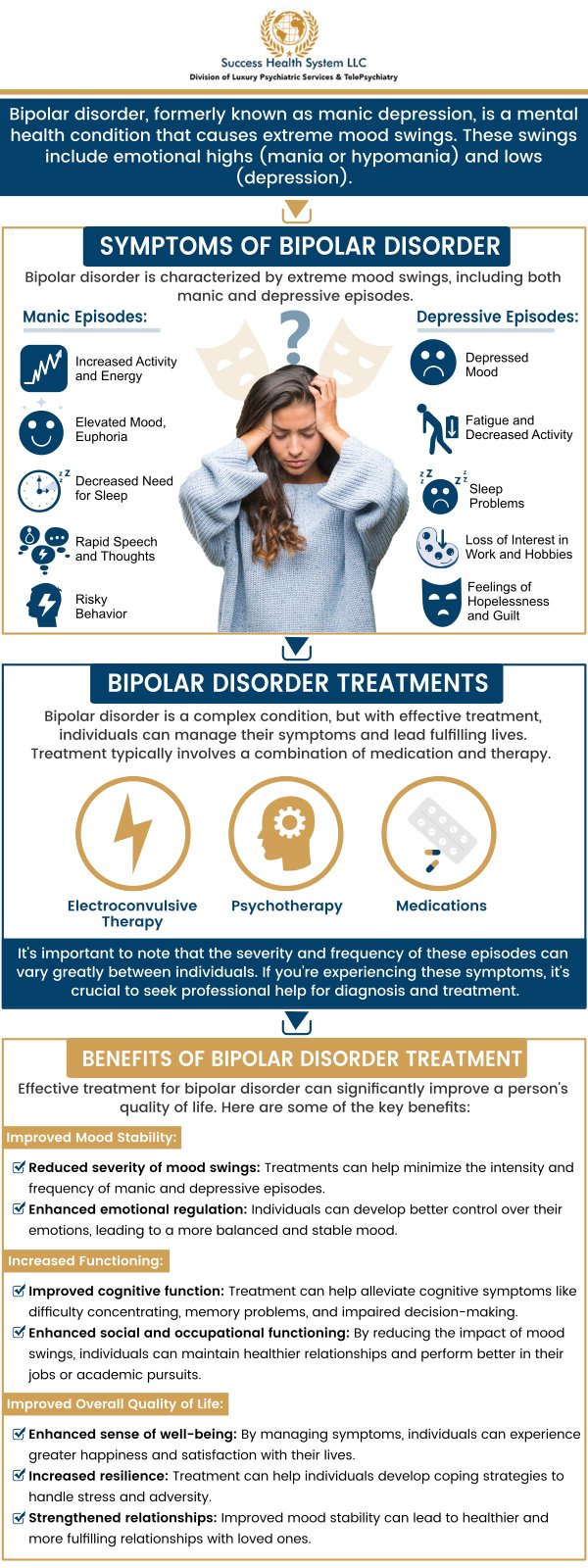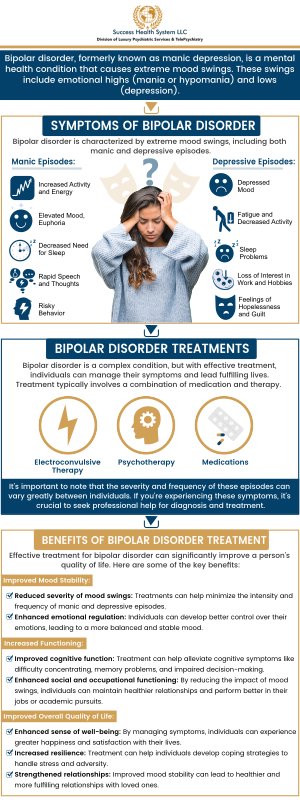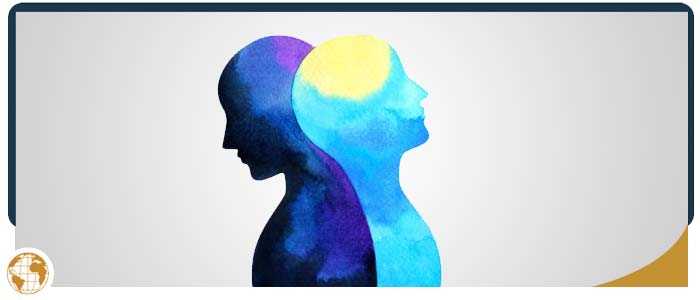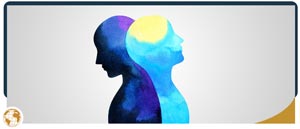Common Causes of Bipolar Disorder Q&A
Success Health System LLC has board-certified psychiatrists equipped to diagnose and treat your bipolar disorder. Dr. Moses Tabe Ambilichu MD, can help manage symptoms like mood swings, irritability, and cognitive delusions. Common causes of bipolar disorder include genetic factors, brain chemical imbalances, and environmental triggers such as stress or trauma, especially in individuals with a family history of the condition. Contact us or schedule an appointment online. We have convenient locations to serve you in Creve Coeur MO, Independence MO, and Columbia MO.




Table of Contents:
How do doctors treat bipolar disorder?
What triggers bipolar disorder?
What are the four types of bipolar disorder?
If you or someone you love has bipolar disorder, it is essential to receive proper care. Bipolar disorder affects a large number of individuals in the world today, but with the right care, long-term recovery is possible. At Success Health System in Creve Coeur MO, St. Louis MO, Independence MO, Columbia MO, and Olathe KS, we have a dedicated staff of board certified psychiatrists who are committed to helping you find the road to recovery through compassionate and friendly care.
The exact cause of bipolar disorder is not fully understood, but it is believed to result from a combination of genetic, biological, and environmental factors. Genetics play a significant role, as bipolar disorder tends to run in families. If a close family member has the condition, an individual’s risk of developing it is higher. Specific genes may influence the likelihood of developing the disorder, though no single gene has been pinpointed.
Biologically, imbalances in neurotransmitters, which are chemicals that regulate mood and emotions in the brain, are thought to contribute to bipolar disorder. Structural and functional changes in the brain, such as alterations in the areas responsible for regulating mood and behavior, have also been observed in individuals with the disorder.
Environmental factors, including significant stress, trauma, or major life changes, can trigger the onset of bipolar disorder or worsen symptoms in those genetically predisposed to it. These factors interact with biological vulnerabilities to increase the risk of developing the condition.
Nearly all cases of bipolar disorder are treated with a combination of medication and some form of psychotherapy. There are a variety of medications that doctors use to treat bipolar disorder, including mood stabilizers, antipsychotics, antidepressants, antidepressant-antipsychotics, and anti-anxiety medications, depending on various factors. These factors include whether you are taking any other medication, the types of symptoms you experience, and what type of bipolar disorder you have. The different types of bipolar are discussed below.
Psychotherapy uses talk-based therapy to help individuals identify both positive and negative feelings, thought-patterns, as well as triggers or situations that exacerbate their disorder. There are four types of psychotherapy that can be used in individual, family, or group settings. They are interpersonal and social rhythm therapy (ISRT), cognitive-behavioral therapy (CBT), psychoeducation, and family-focused therapy. The goal of psychotherapy is to help individuals cope with their symptoms in constructive ways so that they can change their behavior and engage with life more freely.
There is no known definitive cause of bipolar disorder, but there are several factors that may predispose a person to develop bipolar disorder, including genetics and certain neurobiological characteristics. Bipolar disorder is more likely to emerge in individuals that have immediate relatives with the disorder, such as a parent or sibling. It is unclear whether bipolar disorder is hereditary, but studies have shown that there is a link between genetics and bipolar disorder. Imbalances in brain chemistry or hormones are also known to have a role in the emergence of bipolar disorder, as well as environmental triggers like trauma or abuse.
The four major types of bipolar disorder are:
Bipolar I disorder: A diagnosis of bipolar disorder I am given if you have had at least one manic episode, which is a state of heightened euphoria or irritability for at least a week, followed by either a depressive episode or hypomania, which is a less severe form of mania. Psychosis is often a result of mania.
Bipolar II disorder: This form of bipolar disorder involves at least one major depressive and hypomanic episode, but is free of any manic episodes.
Cyclothymic disorder: This diagnosis is given to individuals who have had periodic hypomania or depressive episodes for at least two years, or one year for children, without any major depressive episodes.
Mixed bipolar disorder: Bipolar disorder can also be induced by other medical disorders or from substance abuse. When this happens, the diagnosis is mixed bipolar disorder because multiple treatments are required for the individual.
Managing bipolar disorder involves a combination of medication, therapy, and lifestyle adjustments to help stabilize mood and minimize the frequency and severity of episodes. Medications, such as mood stabilizers, antidepressants, and antipsychotics, are commonly prescribed to help regulate mood swings and prevent relapses. It’s crucial for individuals to adhere to their prescribed treatment plan and consult with their healthcare provider regularly to make necessary adjustments.
Psychotherapy, such as cognitive-behavioral therapy (CBT), can help individuals with bipolar disorder develop coping strategies, manage stress, and recognize early warning signs of mood shifts. Building a strong support system with family, friends, or support groups can also provide emotional stability and understanding.
Additionally, maintaining a structured routine with consistent sleep, balanced nutrition, regular exercise, and avoiding substance use can significantly improve mood stability. Learning stress management techniques and recognizing triggers can also play an essential role in managing bipolar disorder effectively.
For more information, contact us today or schedule an appointment online. We have convenient locations to serve you in Creve Coeur MO, Independence MO, and Columbia MO. We serve patients from Creve Coeur MO, Independence MO, Columbia MO, Overland MO, Bridgeton MO, Blue Springs MO, Kansas City MO, Midway MO, and surrounding areas.

Check Out Our 5 Star Reviews


Additional Services You May Be Interested In
▸Addiction Treatment
▸ADHD Treatment
▸Anxiety Treatment
▸Bipolar Disorder
▸Depressive Disorders
▸Mental Disorder
▸Obsessive Compulsive Disorders
▸Psychotic Disorders
▸PTSD Treatment
▸Phobias and Fears Therapist
▸Psychiatrist
▸Substance Disorder
▸Social Anxiety Psychiatrist
▸Medication Management
▸Psychotherapy
▸Exomind TMS – Columbia
▸Spravato – Independence

Additional Services You May Be Interested In
▸Addiction Treatment
▸ADHD Treatment
▸Anxiety Treatment
▸Bipolar Disorder
▸Depressive Disorders
▸Mental Disorder
▸Obsessive Compulsive Disorders
▸Psychotic Disorders
▸PTSD Treatment
▸Phobias and Fears Therapist
▸Psychiatrist
▸Substance Disorder
▸Social Anxiety Psychiatrist
▸Medication Management
▸Psychotherapy
▸Exomind TMS – Columbia
▸Spravato – Independence





